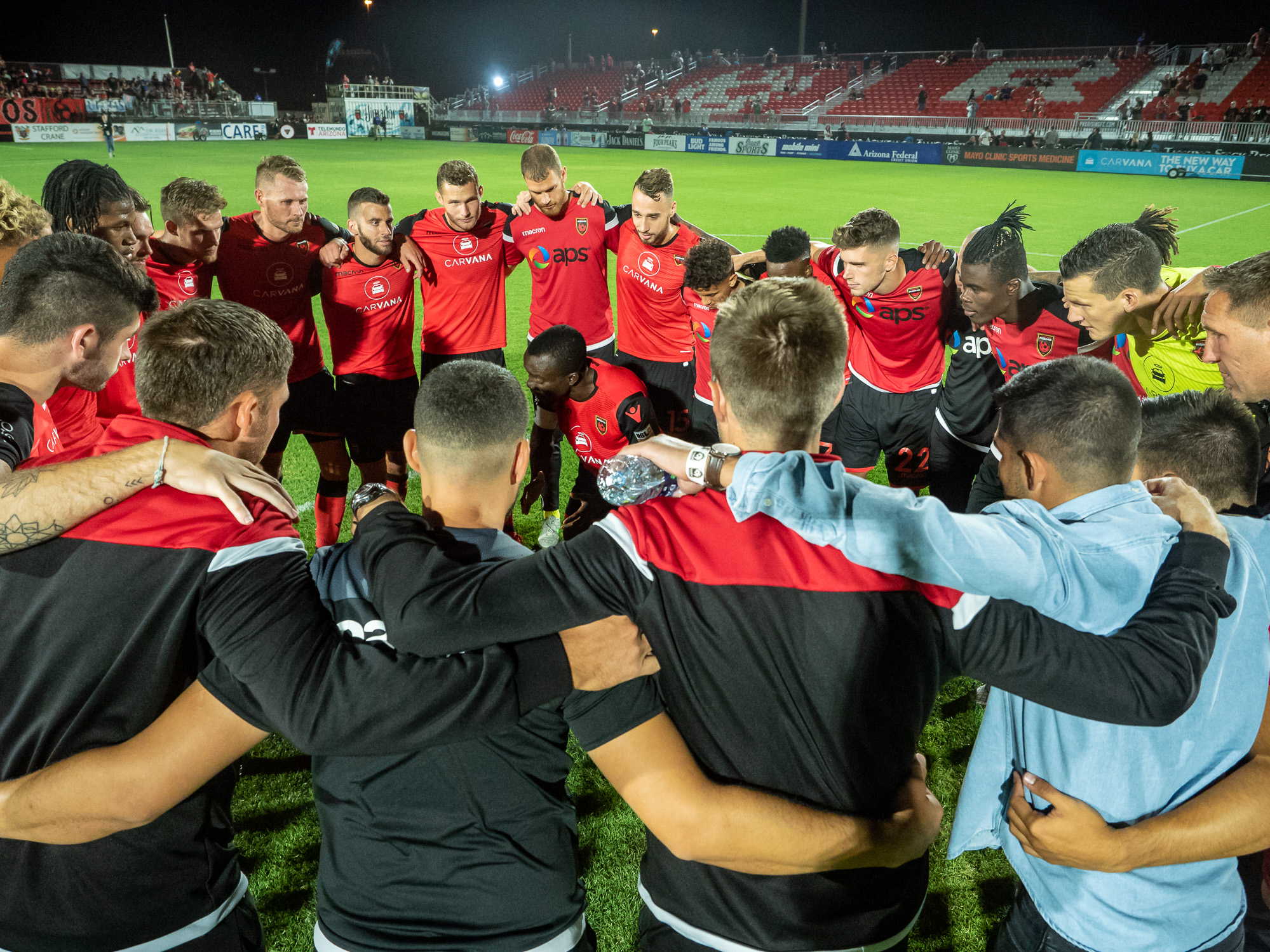Welcome back to Rising Tactics Recap, a weekly column where I attempt to provide insight to Phoenix Rising fans by breaking down some strategic and tactical observations from Phoenix’s latest match.

Slow starts have been a theme for Phoenix Rising in 2019. We saw Phoenix start slowly against San Antonio, New Mexico, and Colorado at the beginning of the season. We saw it against Austin a few weeks ago and now yet again in Saturday’s 2-1 loss to Orange County.
What caused Phoenix Rising slow start this week? Undisciplined play in possession.
There are several keys to creating chances with possession, but one of the most fundamental is rotating the ball from side-to-side in order to shift the opposing team’s defensive block.
Horizontal ball movement is one of the most effective ways to create space in wide areas because it is difficult for defenses to track the ball as it moves back and forth. As teams fail to track horizontal ball movement, space opens up between their defensive lines, which allows for vertical, line-breaking passes.
Phoenix’s ball rotation was almost nonexistent for the first 30 minutes against Orange County. OC started the game by pressing Phoenix’s backline and central midfielders. That pressure flustered Phoenix and made them uncomfortable in possession.
Let’s take a look at this buildup sequence:
- Center backs Joey Farrell and AJ Cochran split out wide and central midfielder Kevon Lambert acts as a central outlet.
- OC’s front two force a ball wide to Farrell.
- OC’s entire defensive shape immediately sprints wide and traps Farrell against the sideline.
What could Farrell have done in this sequence to avoid losing the ball on the right sideline? He could have rotated the ball back into space on the left side of the field. Watch the above clip again and look at all of the open green grass on Phoenix’s left side. A simple pass back to Lubin or a longer switch over to Cochran (who is just out of frame) would have forced Orange County to shift, created gaps between their lines, and allowed Phoenix to maintain possession.
A similar dysfunctional possession sequence led to OC’s first goal.
- Zac Lubin plays the ball wide to Mustapha Dumbuya.
- OC’s defensive shape shifts to close off all of Dumbuya’s forward passing options on that side.
Even with Collin Fernandez unmarked in the middle of the field and ready to rotate possession into open space on the left, Dumbuya attempts a line-splitting pass into heavy traffic. Orange County win the ball and transition their way to a penalty goal.
Fernandez probably should have positioned himself a couple of yards closer to Dumbuya in the above clip, but the point still stands: Phoenix sorely lacked lateral ball movement in the opening stages of this game. They skipped maybe the most critical step to creating chances in possession – ball rotation – and tried to exploit gaps that weren’t there.
I’m not sure how Orange County were able to throw Phoenix Rising off their game so easily. OC defended in a fairly standard 4-4-2 and chose specific moments to press. Their defensive scheme was nothing revolutionary. Phoenix has likely practiced against that exact defensive setup over and over again in training.
Nonetheless, Phoenix looked hesitant in possession in the early stages of Saturday’s game and it cost them a goal.
Phoenix were much more energized and disciplined with the ball after going down 1-0. Orange County moved their line of confrontation back to around midfield and Phoenix Rising started to grow more comfortable moving the ball side-to-side and vertically.
But even by the 30th minute, it was too little, too late. Phoenix Rising were unable to dig themselves out of their self-imposed hole.
The Final Third:
- Junior Flemmings was Phoenix’s only starter that created semi-consistent danger in the attacking half. With his passing, dribbling, and ability to turn out of pressure, Flemmings has fully cemented himself as a playmaker on the left wing. Now all he needs is a creator to combine with on the left side…
- Enter Jon Bakero. Bakero didn’t start after finally making his way back to Phoenix, but he did make it off the bench later in the match. Even in limited minutes, you could see the impact Bakero made in Phoenix’s attack. He increased their speed of play, rotated the ball, and drove attacks forward.
- With Bakero back, there are two players that are likely going to see their minutes decrease: José Aguinaga and Devin Vega. Aguinaga has been very good for Phoenix Rising so far this season, but he does not have Bakero’s attacking flair. With Jason Johnson out for several months due to a lower body injury, Aguinaga should be the first attacking option off the bench for Phoenix. Vega, who was already fighting an uphill battle to get onto the field, has been bouncing back and forth from Tucson to Phoenix and I expect that to continue as the season progresses.
Thanks for reading this week’s edition of Rising Tactics Recap! Check back next week for more insight and analysis.



